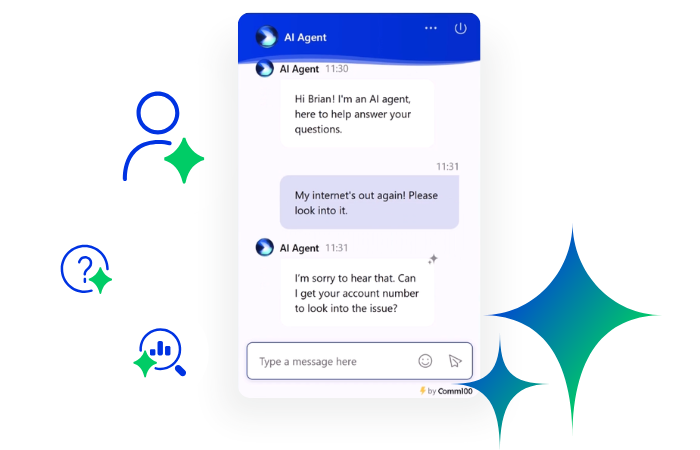Shep Hyken, CX expert and a New York Times best-selling author, sat down with Chris Bechtel, Vice President of Global Marketing at Comm100, to discuss the state of customer experience (CX) today.
They discussed why and how CX expectations have grown so high, what brands can do to meet these demands, and Shep’s opinion on the future of CX. This blog recaps the best bits from this conversation. If you’d rather listen to the full podcast, you can watch the video below:
Question: What does CX mean to you and what led you to enter and remain in this industry?
Answer: “It didn’t start out as CX, it started out as CS, that’s customer service. And when I first started, the concept of customer experience was not even thought about, it was all about service.”
“Experience is everything end-to-end from the moment that customer starts thinking about you until the time they finally purchase, and even after the purchase and continue to ideally purchase more, that’s experience. Service is a big part of that. Service helps drive the experience, but it’s not all of it.”
“And so, over the years, I have morphed as well into the idea that customer service is as important as it is. And this is a big part of what we do here at my company. We take a look at the whole picture, the entire experience. I’m excited about that.”
Question: What’s changed in CX compared to 10 years ago?
Answer: “The companies that figured this out started investing in this, started training people to deliver on it, not just frontline customer service reps, but entire organizations go through training to be more customer-focused. Everybody has a customer, whether it be the outside customer or an internal customer. But what happened is two things, and we can look at it today and say, ‘Wow, we were right in many of these cases,’ is number one, it helps make you more competitive. Because at the end of the day, we have research that shows even in today’s frustrating economy, if you will, the idea behind a great service experience makes price less relevant. Not quite as irrelevant as it was before or less relevant, it’s never irrelevant. There’s a point where people say, “I don’t care how nice these people are, how great the product is. It’s too expensive.”
But recognize that many customers, the majority, are willing to spend more money for convenience, for less friction, for an easier experience, for knowing they’re going to get what they want and to get what they expect. So, I see companies have been investing, I’m going to say around 2010, which is just a little over 10 years ago, there are all kinds of reports that came out that said, by 2020 customer experience would be not only one of the most important differentiators, but this is where companies would spend a lot of their money. And here we are in 2022, and that’s exactly what’s been happening.”
Question: Why do you think CX expectations have increased so much in this digital-first world? Any thoughts as to competition, technology, our culture?
Answer: “I think companies have invented great technologies. By the way, nothing really new was invented during the pandemic. Everything that was being used had already been there. We were forced to adapt and adopt and start using it, which meant that the comfort level of using it increased simply because we were forced into it and realized – hey, this is a really good option.
Companies need to use the technology that their customers want to use. And even if they don’t know, they want to use it. We need to train them on using it, and that’s very important. I want to go back to years and years ago when Delta Air Lines was the very first airline to introduce the idea of online booking, where you didn’t have to call the agent, you could actually do it online. A lot of people resisted this because it just felt uncomfortable going on the computer, looking up their flights, the potential schedules. But what Delta did is they gave them an incentive to do so.
There was a financial incentive. People picked up on that and took advantage of it. Then they said, ‘Hey, book direct with the airline instead of the reservations through the website, and we’ll give you extra miles or points toward the program.’ And people loved that. And what happened is over a certain period of time, it became the norm. They didn’t even have to offer incentives anymore because I don’t know about you, but when was the last time you picked up the phone to call a reservationist for an airline? It doesn’t happen very often unless there’s a problem. And this is where it’s really important. Technology is great until it’s not. And if it’s not, for whatever reason, the customer is struggling, has a problem, they need to be able to seamlessly connect to a live agent.
And this is also important. And this goes to exactly what your company does. And that is you believe very strongly in omnichannel, which means across the board, I want to have an experience regardless of whatever channel I’m reaching out on. If it’s text, if it’s online and I’m filling out a form, if I decide to pick up the phone, wouldn’t it be nice if I pick up the phone to call an agent because I’m having a problem and the agent says, ‘Hey, I see that you are on our website. Were you having trouble with this particular issue?’ It just makes the conversation continue rather than start over again and again. The more times it starts over, the more frustrating it is for the customer.
And that is a disrespect of the customer’s time, and therefore the customer has this negative feeling about the company and the friction that was created in trying to get their problems out. By the way, I just want a little disclaimer here. Most of the time, we can do that. Every once in a while, we’re going to have to do things that are a little bit painful for the customer in order to get them what they want, but how it’s handled is key. And if it’s managed the right way, if the right words are used, if the empathy, the passion and the desire to help the customer are obvious, the customer starts to forget about the friction that they have been put into and starts to really look at that brand and say, ‘You know what, they’re there to help me out.’ That’s what it’s about.”
Question: How do you feel about automation and AI?
Answer: “Well let me assure you that the agents’ job is still very secure, at least, for the near future, if not, even long term. And this is good for both the agent and the customer is that we are coming up with technologies. We, meaning the world, the customer experience world, your company included coming up with technologies, they’re going to make it better for both agents and customers. And when customers can get their questions answered digitally through online tutorials, through videos that might even be not just on a channel of a website, but maybe even on YouTube for the world to see how to use the products that companies offer, when they can look up and pieces of information that they’re looking for and deal with a virtual agent. Virtual agent, meaning technology, AI, infused agent, not a virtual working from home agent, not a live agent.”
Question: I’m sure you’ve worked with customers’ organizations that know they should make some changes, they know they’re not quite delivering what they should, but they’re a little slow to make it happen. What would you say to them?
Answer: “Well, why don’t you just take a look at what your competitors are doing? And trust me, they’re thinking about it right now. If all you’re doing is thinking about it, they’re thinking about it, too. And one of you is going to make a move faster than the other. Why shouldn’t it be you? So, jump on it and recognize it. It is a competitive advantage.
If you want to be customer-focused, that doesn’t mean that every decision you make is perfect for the customer, it means every decision you make has the customer in mind. And the most simplistic example of that is nobody is happy with the price increase, but if that’s what we have to do in order to stay in business, keep the quality of our product up, the quality of the service and experience up, we need to raise those prices. That’s happening in the economy we’re in right now. Inflation is extremely high. People are not happy with price increases. However, the ones that are accepting the companies that, I guess, they’re very transparent, they communicate well why prices are being raised.
If we need to invest in technology just to keep up, it’s one thing. But if we’re doing things to make the entire experience better, we should be doing that and we should explain to the customer why they pay what they pay. Take a look at, you’ve got the Ritz-Carlton next to a Holiday Inn, both of them are full. Why? If one is more expensive than the other, how come that Holiday Inn isn’t taking all the business away from the more expensive hotel, the Ritz-Carlton? And the answer is simple. People appreciate the value prop that the Ritz offers. If your company has a value prop of service and experience, and you can prove that it’s different and different enough to make their life easier, more convenient may even save them money long term.
If you save them time, you could be saving them money. If you can prove that without a shadow of a doubt, your customers are going to be very happy with you.”
Question: What’s the one thing, if anything, you would wish everyone who is dealing with customers of today would be thinking about?
Answer: “I really wish every company would focus on the culture because I mentioned this earlier, what’s happening inside an organization is felt on the outside and we need to create a culture that’s customer-focused and it starts with employees. We treat them right. We train them well. We empower them to do their jobs. We congratulate them when they do a great job. We give them opportunity for advancement and sometimes advancement is within the company or it’s giving them the education they can receive from you through training that makes them better and more marketable. And that’s fine.”
Question: If you had advice to those out there that are still thinking, ‘Well, we just have one or two channels for support and that’s good enough?’ What would you say to those folks if they’re sitting there going, ‘Yeah, it’s fine – it’s good enough.’?
Answer: “Fine is not fine, by the way. Fine is definitely not fine. Here’s what I would say, you should talk to your customers, you should interview them, you should listen to what they’re saying and realize if they’re asking for something. And by the way, there will always be one-offs. But if a majority of people are asking for the same thing, you better give it to them because it says they’re not getting it from you, there’s going to be somebody else who’s around the corner, down the street, just on the other side of the internet, if you will, who’s going to be able to give that customer what they want and expect. So listen to your customers and ask them what they want. We’re talking about channels, how do they want to communicate with you? Maybe many of them want to go digital. That’s fine. Always have that human fallback.”
Curious for more insights from this interview on how to meet the rising CX expectations of today’s customers? Watch the video below for the complete interview.






